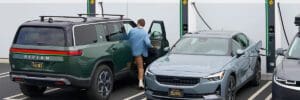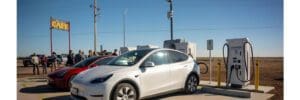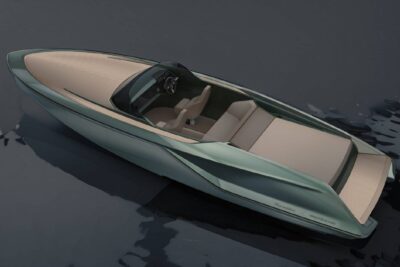
10 Dec 2024 | Nissan Gets Supercharger Access, VW ID.4 Deliveries To Resume and BYD Becoming A Giant



SOLiTHOR has made advancements in the development of its lithium solid-state batteries, which are designed to help the aviation and maritime industries accelerate their electric transition.
The latest advancements include improvements in cyclability, energy density and readiness for industrialization.
Recent testing of SOLiTHOR’s pouch cells, conducted at a moderate temperature of 25° C and with external pressure below 72 psi/4.9 atm, has resulted in 1,000 full charge discharge cycles with a coulombic efficiency above 99.2 %. The testing measured endurance, which is a key performance requirement for long-lasting aviation and maritime applications.
The company’s thin Gen-1 solid electrolyte combined with thin lithium metal and high-loading nickel-manganese-cobalt (NMC) cathodes enables specific energy of 384 Wh/kg and energy density of 1,026 Wh/l at stack level obtained on a different set of cells. These gravimetric energy values are significant for the aviation and maritime sectors, which require lighter, safer and more powerful batteries.
Relative discharge capacity as a function of number of full cycles for a representative Lithium metal-solid state pouch cell based on NMC / Gen 1 Solid Electrolyte / Li metal components
SOLiTHOR’s solid-state technology is fully compatible with commercial cathode components manufactured in the lithium-ion battery industry. This will enable the rapid industrialization of its products in the coming years by leveraging lithium-ion battery production lines at low cost, according to the company.
SOLiTHOR has manufactured 3 Ah pouch cell prototypes, which it is running through its internal performance and safety testing protocols. Its short-term plan is to send those prototypes for external validation and testing at aviation and maritime manufacturers.
“Aviation and maritime vessels require high power and high energy to provide the necessary electrification to safely transport aircraft and ships over longer distances. One of SOLiTHOR’s long-term objectives is to partner with battery manufacturers to mass-produce the cells for both our aviation and maritime clients,” said Huw Hampson-Jones, the company’s CEO.
Source: SOLiTHOR

US EV startup Rivian plans to launch its first next-generation Rivian Adventure Network charging locations, which allow for non-Rivian electric vehicles to charge alongside the company’s R1T pickup and R1S SUV.
The sites use a new charger design to accommodate any compatible EV in North America. The first site is its Joshua Tree Charging Outpost in California. The company expects to open additional charging locations at sites in Texas, Colorado, Illinois, Montana, Pennsylvania, Michigan and New York.
The chargers will deliver rapid charging at up to 900 V and feature CCS connectors with support for North American Charging Standard (NACS)-equipped vehicles with an automaker-approved adapter. Support for native NACS connectors, also known as SAE J3400, will come with a future hardware update.
The chargers meet the design and siting requirements for federal and state infrastructure funding, allowing Rivian to further expand its charging infrastructure for all EV drivers.
Each charger will also include a larger display and tap-to-pay for use with or without the Rivian mobile app.
“Since the beginning, we’ve understood that creating products like the R1T and R1S only made up half the equation,” said Rivian founder and CEO RJ Scaringe. “To achieve widespread electrification, you also need a good charging network.”
Source: Rivian

The first EV charging station in Texas funded by the National Electric Vehicle Infrastructure (NEVI) Formula Program has opened along Interstate 27 in the rural community of Happy, Texas.
Located in the Texas Panhandle region, the site bolsters EV charging in west Texas and supports interstate travel. The station has four ports, each with a maximum charging speed of 180 kW. Each has both CCS and J3400 connectors.

“The addition of the new NEVI charging station will increase rural charging accessibility and enable uninterrupted EV travel along key travel routes,” said Gabe Klein, Executive Director of the Joint Office of Energy and Transportation.
Rivian: The Underdog Shaping the EV Industry
If you’re following the EV market, you’ve probably noticed Rivian making waves. While Tesla might be the reigning champ, Rivian is quietly and confidently carving its niche. What makes Rivian different? It’s not just about selling electric trucks and SUVs—it’s about creating an experience, building community, and pushing the boundaries of what an EV can do.
Let’s take a closer look at how Rivian is positioning itself to take on the competition.
When Rivian launched its R1T truck and R1S SUV, it wasn’t just selling vehicles—it was selling a lifestyle. These rugged, adventure-ready EVs appeal to people who love exploring the great outdoors. With features like a built-in camp kitchen and impressive off-road capabilities, Rivian vehicles are made for the wild.
This focus on adventure is a stark contrast to Tesla’s sleek, city-focused designs. While Tesla aims for mass appeal, Rivian has zeroed in on a passionate niche: adventurers who want to explore sustainably.
One of Rivian’s boldest moves this year was opening its Adventure Network to all EV owners. Starting with a charging station in Joshua Tree, California, Rivian is expanding this network to 3,500 chargers across 600 locations.
Why does this matter? Because access to charging stations is a major hurdle for EV adoption. By inviting all EV drivers to use its chargers, Rivian is fostering a sense of community and encouraging more people to go electric. It’s a move that sets Rivian apart from Tesla, which only recently began opening select Superchargers to non-Tesla EVs.
Rivian isn’t going it alone. The company has built strong relationships with major players like Amazon and Volkswagen:
These partnerships give Rivian the financial stability and market credibility it needs to grow in a competitive space.
Let’s talk numbers. Rivian’s stock hasn’t had the easiest year, with a year-to-date decline of around 38.4%. However, recent momentum suggests a potential turnaround:
This recent uptick shows that investors still believe in Rivian’s long-term vision.
Rivian’s journey is just beginning. While it has challenges—scaling production, competing with Tesla, and navigating the EV market—it also has massive opportunities. Its focus on a niche market, commitment to sustainability, and innovative partnerships position it as a serious contender in the EV race.
Rivian might not be Tesla, but it doesn’t have to be. The EV market isn’t a zero-sum game, and Rivian is carving out its unique space. Whether you’re an EV enthusiast or just curious about the future of transportation, keep an eye on Rivian. It’s proving that sometimes, the underdog has the most exciting story to tell. Are you ready to see Rivian take on the giants, or are you rooting for the established players? Share your thoughts below!
There are some interesting new cell technologies that have come to market in the last few years, and a few more on their way, that are worth reviewing. Despite their […]
The post OPINION: “Despite small market share, new battery technologies attract great attention” appeared first on Electric & Hybrid Vehicle Technology International.

Sports car manufacturer Porsche showed that it not only masters the construction of road vehicles, but can also provide propulsion on the water: Together with the Austrian Frauscher shipyard, Porsche is presenting an electric sports boat.
The US Army has declared a mission to mitigate and adapt to climate change by becoming a more efficient force. To do this it announced the Army Climate Strategy (ACS) […]
The post FEATURE: Electrifying the military appeared first on Electric & Hybrid Vehicle Technology International.
German automotive engineering firm FEV and battery developer ProLogium have unveiled a new Large-Footprint Lithium Ceramic Battery (LLCB) technology that promises significant advances in electric vehicle performance. The battery features […]
The post FEV and ProLogium debut solid-state battery with 1,000km range potential appeared first on Electric & Hybrid Vehicle Technology International.

Brittany Ferries will put a hybrid ferry with a 12 MWh battery into operation in February 2025. The ship, named Saint-Malo, will be deployed in the English Channel and will serve the ferry route between Saint-Malo in France and Portsmouth in the UK.